Art Fairs
In Milan, a Ritzy Collector Class and a New Institutional Landscape Bolster the Already Buzzing Miart Art Fair
The mood at the 2023 edition of the fair was bright.
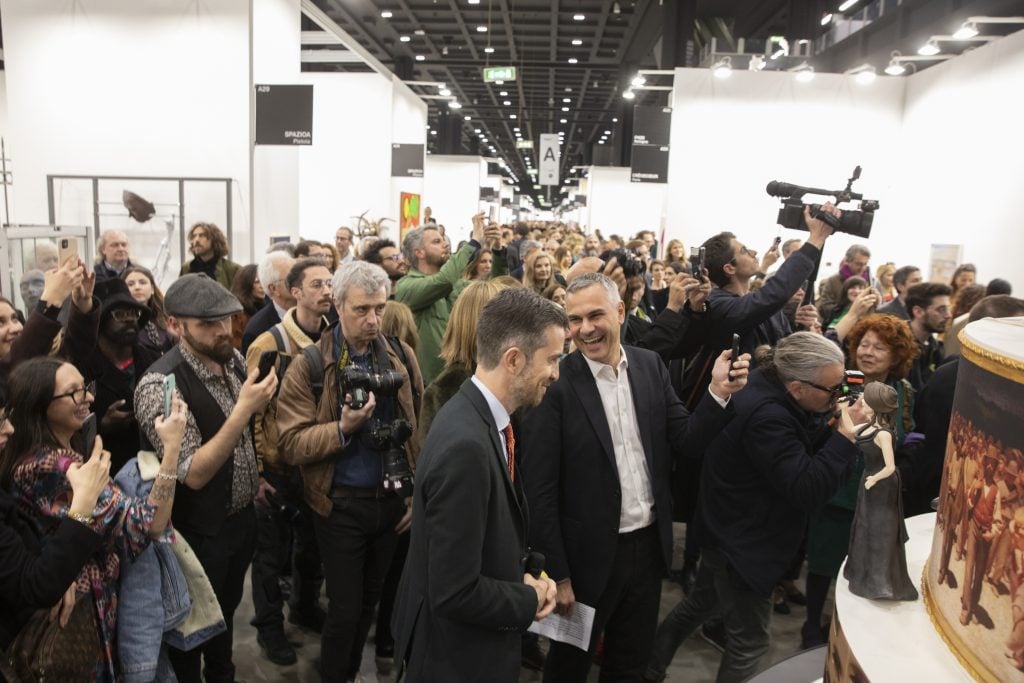
The mood at the 2023 edition of the fair was bright.

Hili Perlson

Can Milan, the moneyed capital of Lombardy in northern Italy, finally stake its claim as a contemporary art hotspot? The opening of Milan’s Art Week in mid-April, organized around the 27th edition of the art fair Miart, marked a further step in that direction. It’s a slow but steady process that began with the reopening, after decades, of the Milan Triennale in 2015; the game-changing mega-exhibition ignited the coming out of the shadows of the city’s bigger creative industries: design and fashion.
And although last week’s Art Week, with its pared-back events and not-so-late-night negronis at Bar Basso, felt at times like a tame prelude to the big-ticket design fair Salone del Mobile, which opens this week, there was a palpable thrill in the air about where the city is headed. Two key events on the horizon will soon make an impact on Milan’s international standing: the opening of its first public museum for contemporary art, in 2024, at Piazza del Duomo, and the arrival of the 2026 winter Olympics to the region of Milan-Cortina, with the medal ceremony taking place on that same stunning piazza.
But until the museum opens, private foundations are still the main supporters of contemporary art in Milan, and the week kicked off on April 12 with cocktails at Fondazione Prada, where an exhibition by film director David Cronenberg featuring spooky 18th-century anatomical models from Florence’s La Specola museum is currently on view. The following morning, the aisles were bustling on Miart’s VIP preview day, with the city’s collector-class mirroring its convergence of fashion, design, and storied Italian lineages.
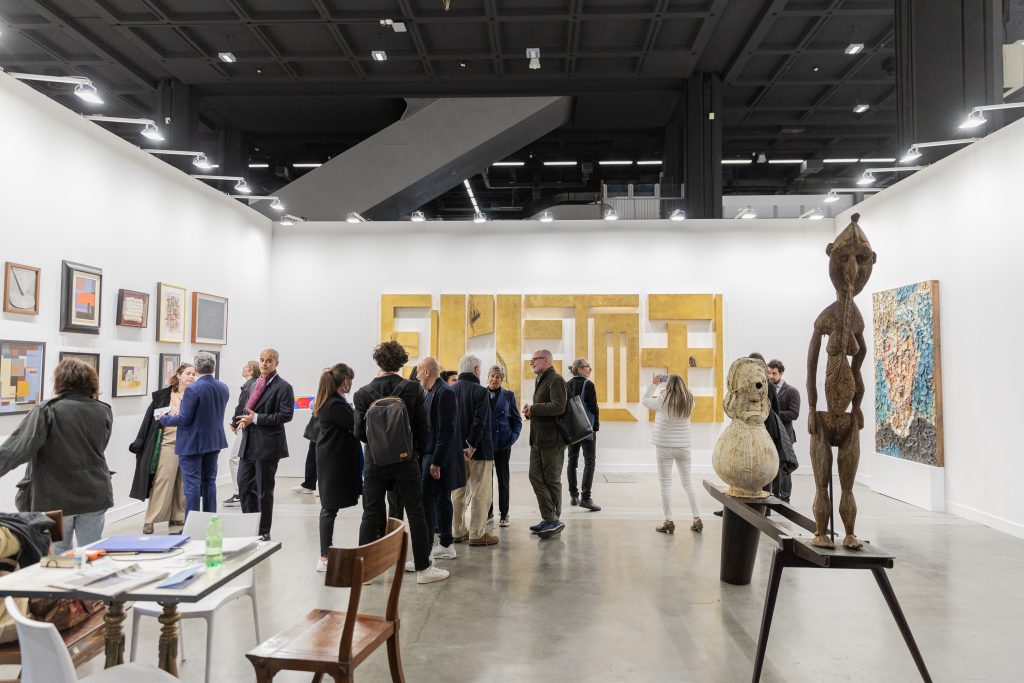
Gian Enzo Sperone at Miart 2023. Photo: Nicola Gnesi
Beatrice Bulgari who inaugurated the Fondazione In Between Art Film during the 2022 Venice Biennale, and Barnaba Fornasetti, CEO of the renowned atelier for decorative ceramics established by his father, were among the many collectors making the rounds, as was Alessandra Borghese, the aristocrat and culture manager behind commissioning paintings by Adrian Ghenie for a church in Palermo. Turin- and London-based collector Patrizia Sandretto re Rebaudengo made it clear that “stealth wealth” has no place in this fashion capital, cutting a regal figure in a bright magenta coat and monogrammed Gucci accessories. “All she’s missing is a corgi,” a British art professional quipped quietly.
With international exhibitor numbers up 40 percent from last year, and new participants including established dealers like Esther Schipper, Clearing, or Crèvecœur—who all occupied prime corner booth real estate—Miart is going strong. “Collectors here are very open-minded, and have a deep aesthetic understanding,” said Sebastian Klemm, co-founder of Berlin’s Klemm’s gallery, a second-time exhibitor. Their booth, featuring moderately priced paintings by Fiona Mackay and hand-shaped sculptures by Émilie Pitoiset, made of vintage Hermès gloves, was performing well among the design-savvy collectors.
Freddie Burness, director of London’s Cadogan gallery, which opened an outpost in Milan three months ago, also praised the city’s collectors and energy. “Milan is growing fast, economically speaking. It’s very unique for Europe.” He was showing a solo booth of paintings by Texan artist Terrell James, with prices ranging between €7,500 ($8,234) and €24,000 ($26,350).
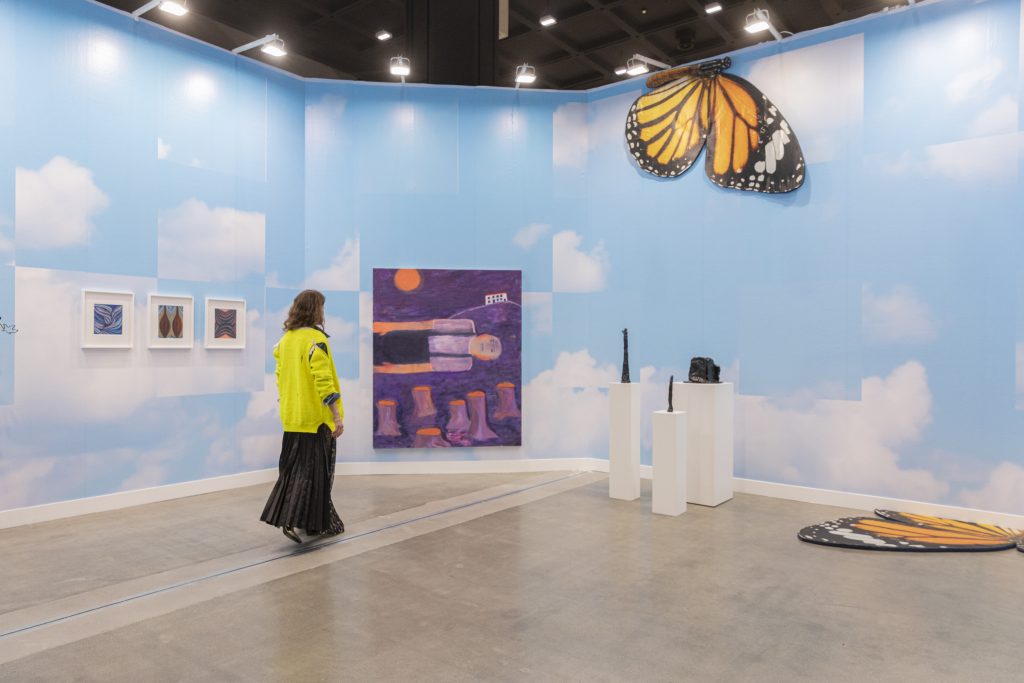
Kaufmann Repetto, Milan and New York, at Miart 2023. Photo: Nicola Gnesi
Miart’s director Nicola Ricciardi established a number of new acquisition awards in partnership with the city’s industries, and invited a slew of international curators to sit on juries, including Bettina Steinbrügge, the newly-appointed director of the Mudam Luxembourg; Hayward director Ralf Rugoff; and Bruna Roccasalva, artistic director of the Furla Foundation, accompanied by her husband Vincenzo De Bellis, who was Miart’s director from 2012—2016—after some years as the Walker Art Center curator, he was recently named Art Basel’s director of fairs and exhibition platforms in 2022. “Milan is really on the map now,” said Milan-born Nicola Trezzi, director of CCA Tel Aviv-Yafo. “I brought patrons of the center on a trip here for the first time last September. And the fair wasn’t always like this either; this is Vincenzo’s achievement, and now see where he is! They understood that he can do miracles.”
“I’m extremely happy with the quality and the energy,” said Ricciardi. “We’ve been back-to-back with Salone since 2015; both fairs benefit from one another. This was interrupted in the post-lockdown editions of 2021 and 2022, but we’ve already planned for the upcoming editions to be timed like this.”
On the weekend, as more international visitors arrived for the major design fair, the aisles at Miart filled even more, and deals were being closed briskly. “We overbooked hotel rooms three times for our international collectors and curators. Michael Stipe is coming!” Ricciardi beamed, admitting to being a “huge fan.”
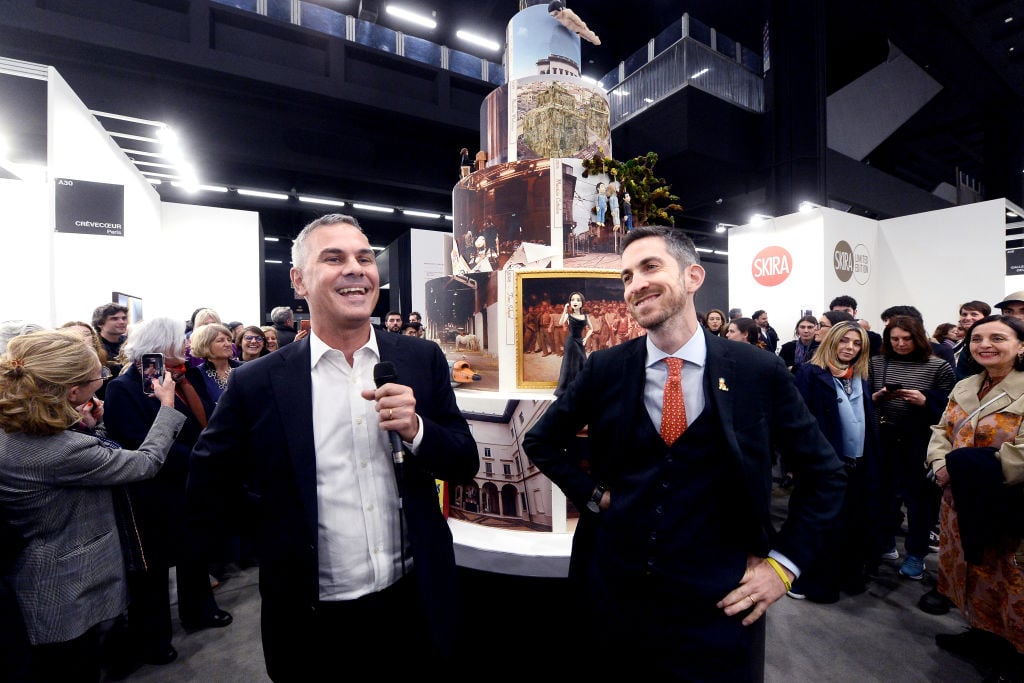
Massimiliano Gioni, and director of Trussardi Foundation and Nicola Ricciardi, art director of Miart, with a tiered cake from Maurizio Cattelan. Photo: Roberto Serra – Iguana Press/Getty Images
Nearby, Massimiliano Gioni was standing next to a tiered cake gifted to the Fondazione Trussardi, where he’s been artistic director since 2003, by Maurizio Cattelan on the occasion of the foundation’s 20th anniversary—it featured key exhibitions from the foundation’s history rendered in sugar and butter. The nomadic foundation’s next project will open in June, in a 19th-century puppet theater, known as the Teatro alla Scala in miniature, and will feature Italian artist Diego Marcon. “The locations have become as important as the art,” Gioni added. “We’ve exhibited in some spectacular spaces around Milan that the public doesn’t usually have access to.”
Over at the Decades section, where galleries hold presentations dedicated to reevaluating 20th-century artists, some true gems awaited visitors. Florence-based Frittelli gallery showed the letters M and E from Tomaso Binga’s 1976 series Scrittura vivente. Binga is the nom de plume of Bianca Menna, who wed her own alter ego in 1977 to mark her metamorphosis from woman to artist in a statement about the exclusion of women artists from the art world. Her work was shown in the 2022 Venice Biennale, and is now on view in a meticulously curated exhibition at Bolzano’s Fondazione Antonio dalle Nogare, which looks at avant-garde women artists working with language.
Across several other booths in the Decades section, Italian art from the 1920s and 30s was on view, including unique ceramic works by architect and artist Gio Ponti, created for the 1925 Monza Biennale at ED gallery, and a historical presentation by Duilio Cambellotti at Galleria Russo. Over at the Museo del Novecento at Piazza del Duomo, which is about to receive a new contemporary art section, there was similarly a focus on the controversial modernism of Italy’s avant-garde and Futurist movements.
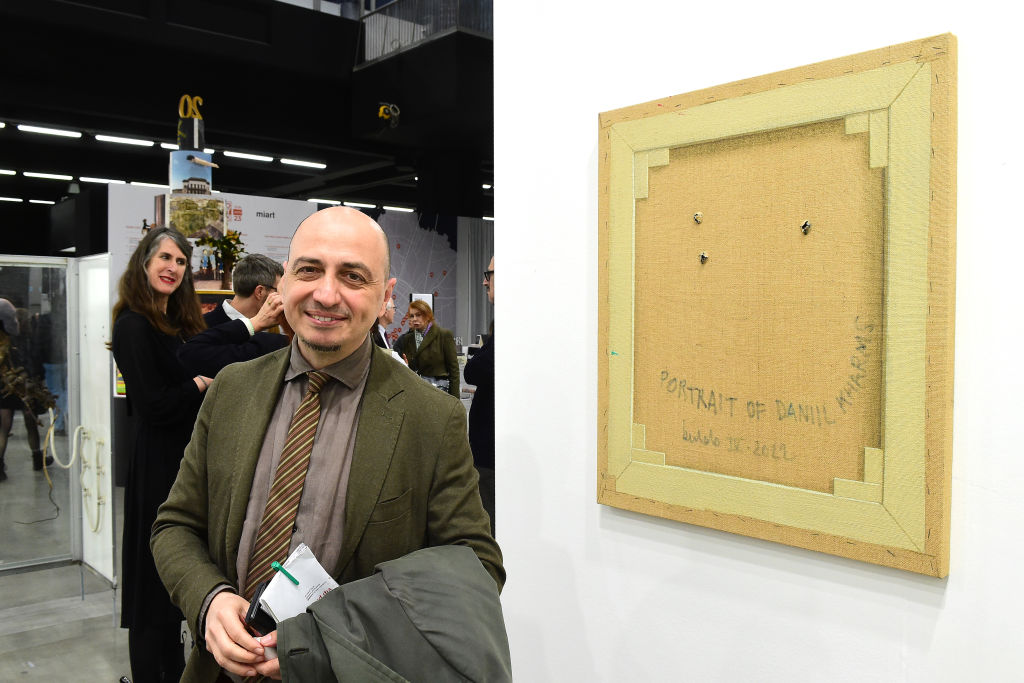
Italian art historian Gianfranco Maraniello director of Milan’s Museums of Modern Art. Photo: Roberto Serra – Iguana Press/Getty Images
Gianfranco Maraniello, who became the director of the city-owned museums of modern and contemporary art in 2022, told Artnet News that the exhibition opened long before Italy’s right wing government announced it will fund exhibitions devoted to the Futurist movement (ideologically, many Futurists supported Fascism). Perhaps the rush to contextualize this era is a preemptive move on behalf of museums and galleries.
Maraniello was excited about Milan’s collectors’ support for the upcoming contemporary art museum, which will open next door and connect to the Museo del Novecento with a bridge. He divulged that the soon-to-open institution has recently received a €5 million ($5.5 million) donation from a local collector, no strings attached. “She doesn’t want her name on a wing, and she didn’t donate through a foundation, it came straight out of her bank account.” It’s like everyone got the memo, and are working together toward making Milan the important hub for contemporary art that it should be.
More Trending Stories:
A Museum Has Located a Missing Figure That Was Cut Out of This 17th-Century Family Portrait
Ai Weiwei Has Recreated Claude Monet’s Iconic ‘Water Lilies’ Using 650,000 Multi-Colored Lego Bricks
London Will Honor the Victims of the Transatlantic Slave Trade With a New Memorial in the Docklands